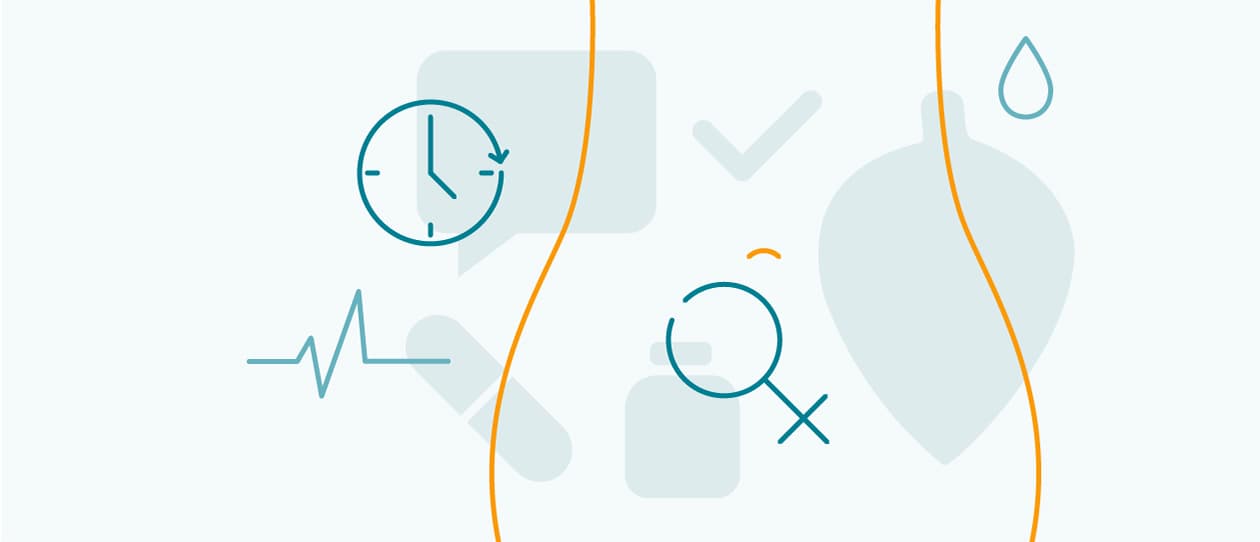
- Health hub/
- Women's health/
- Pre-menstrual syndrome


Symptoms of PMS start one to two weeks before the onset of menstruation, and go away when the period starts, or soon afterwards. There are many symptoms that may occur as part of PMS including:
- Fatigue, sometimes with excessive sleepiness (hypersomnia)
- Food cravings (especially for chocolate, sweet and salty foods) and appetite changes
- Bloating and fluid retention, which may lead to weight gain, and can cause swelling of the fingers, abdomen and ankles
- Breast tenderness and pain
- Headaches, backaches, muscle aches and joint pain
- Uterine cramping
- Depressed mood, anxiety and crying spells
- Mood swings, irritability, hostility, tension, anger
- Feeling overwhelmed
- Poor concentration
- Insomnia and disturbed sleep
- Acne, oily skin and/or oily hair
- Digestive disturbances, such as diarrhoea or constipation
- Libido changes
It is not clear why some women are affected by PMS and others are not, or how the symptoms of PMS are caused. However, PMS is believed to largely occur as a result of the changes in the levels of oestrogen and progesterone that occur during the luteal phase of the menstrual cycle, which commences at the time of ovulation (usually the 14th day after the start of menstruation if your cycle is 28 days).
Other hormones may also be involved (for example, some symptoms, such as breast tenderness, have been linked to an excess of prolactin, a hormone that stimulates the production of breast milk).
Mineralocorticoids are a group of hormones that regulate the body’s fluids. Changing levels of these hormones may cause the fluid retention and bloating that many women experience. Similarly, hormonal imbalance may affect levels of neurotransmitters such as serotonin, and this may lead to emotional symptoms such as anxiety and depressed mood.
The symptoms of PMS may be aggravated by a wide range of factors, including stress, genetics, the number of children you’ve had, underlying physical or health problems (e.g. underactive thyroid, depression), and exposure to compounds called xeno-estrogens, which are present in our environment (e.g. from some pesticides).
Additionally, a number of dietary factors appear to influence PMS symptoms. These include:
- High dietary intake of salt, which is especially linked to fluid retention
- Consumption of excessive quantities of sugar, alcohol and/or caffeine, which are linked to disturbed moods and energy problems. Blood sugar imbalance may also be a factor for some women.
- High fat diets, especially those high in saturated fat
- Low intake of magnesium and calcium
Regular exercise appears to offer a degree of protection from PMS, and is associated with less susceptibility to both emotional and physical symptoms.
- In traditional western herbal medicine, Vitex agnus-castus is used to help normalise heavy, absent or irregular periods and relieve PMS symptoms such as breast tenderness and fluid retention.
- Taking vitamin B6 may help relieve PMS symptoms, including breast tenderness, fluid retention and mood changes.
- Keeping a symptom diary for two to three months may help you identify a pattern to your symptoms. Recording factors such as your PMS symptoms, their severity, triggers, diet and exercise will enable you to work with your healthcare professional to minimise the symptoms.
- Dietary changes effectively reduce PMS symptoms for some women. Minimise your consumption of sugar, salt and alcohol, and stick to a diet that’s low in fat (especially saturated fats, from animal products) and rich in whole grains and fresh fruit and vegetables.
- Avoiding caffeine is also important in the prevention and treatment of PMS, especially for those who experience symptoms of breast tenderness, anxiety, irritability, insomnia or depression. Reduce your caffeine levels gradually in order to avoid withdrawal symptoms.
- Women who experience symptoms of food cravings and mood swings may benefit from eating several small meals per day to help maintain stable blood sugar levels.
- PMS symptoms tend to be more severe in women who don’t exercise regularly. Exercise also improves stress and mood and prevents weight gain. Aim for at least 30 minutes of brisk or vigorous activity on most days of the week.
- Seek professional advice if your premenstrual symptoms are severe enough to interfere with your performance at work or school or disturb your personal relationships or if you experience premenstrual depression or other emotional problems.
- Severe PMS symptoms may be an indication of an underlying problem and should be investigated by your healthcare professional.




